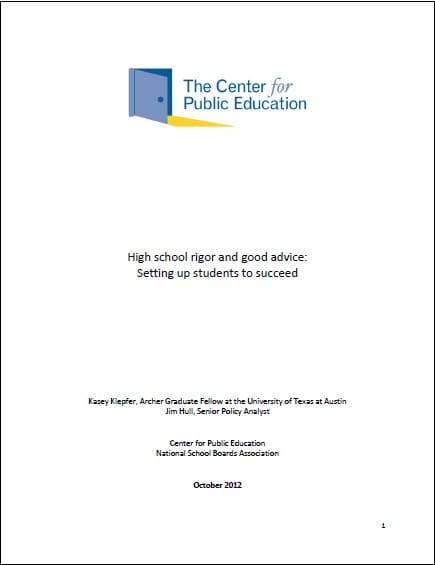 The statistics, though jarring, are not novel: In 2009, only 58 percent of students who had enrolled in four-year colleges graduated within six years (just 79 percent persisted through their first year of post-secondary schooling). Just one-third of those who matriculated at two-year institutions completed their degree within three years (two-thirds persisted to year two). The figures are even starker for low-income students; even high-performing youngsters from this demographic struggle. This report from the National School Boards Association (NSBA) offers tangible recommendations for what can be done to reverse this trend. Using data from the Educational Longitudinal Study, NSBA authors track characteristics of students who successfully persist through year two of post-secondary schooling. Controlling for prior achievement and socioeconomic status, NSBA finds three traits of high schoolers that predict greater success in college: taking upper-level math courses (students of low socioeconomic status who took pre-calculus or calculus were 44 percent more likely to persist to year two than those who took only algebra or geometry), enrolling in AP or IB courses (even if the student did not pass the associated exam), and consistently meeting with academic advisors. (Researchers did not examine how participation in high school extracurriculars affected college completion.) “No excuses” charter schools have long experimented with these types of initiatives—and have shown them to be successful. But the NSBA fails to acknowledge a key factor: Academic readiness and innate smarts are only two rungs on this ladder to college success. Students’ abilities to persevere through challenging circumstances are also necessary for them to persist in college.
The statistics, though jarring, are not novel: In 2009, only 58 percent of students who had enrolled in four-year colleges graduated within six years (just 79 percent persisted through their first year of post-secondary schooling). Just one-third of those who matriculated at two-year institutions completed their degree within three years (two-thirds persisted to year two). The figures are even starker for low-income students; even high-performing youngsters from this demographic struggle. This report from the National School Boards Association (NSBA) offers tangible recommendations for what can be done to reverse this trend. Using data from the Educational Longitudinal Study, NSBA authors track characteristics of students who successfully persist through year two of post-secondary schooling. Controlling for prior achievement and socioeconomic status, NSBA finds three traits of high schoolers that predict greater success in college: taking upper-level math courses (students of low socioeconomic status who took pre-calculus or calculus were 44 percent more likely to persist to year two than those who took only algebra or geometry), enrolling in AP or IB courses (even if the student did not pass the associated exam), and consistently meeting with academic advisors. (Researchers did not examine how participation in high school extracurriculars affected college completion.) “No excuses” charter schools have long experimented with these types of initiatives—and have shown them to be successful. But the NSBA fails to acknowledge a key factor: Academic readiness and innate smarts are only two rungs on this ladder to college success. Students’ abilities to persevere through challenging circumstances are also necessary for them to persist in college.
SOURCE: Kasey Klepfer and Jim Hull, High School Rigor and Good Advice: Setting Up Students to Succeed (Alexandria, VA: National School Boards Association, Center for Public Education, October 2012).
